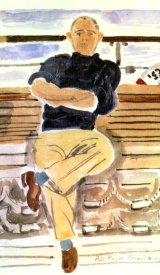 |
1910 - 1975

They lived in Cefallonia for a few years and later from 1921 to 1932 in Pireas, where Nikos Kavvadias finished elementary school and then the Gymnasium. He wrote his first poems as a pupil at the elementary school. In 1929, he started working as a clerk in a shipping office and a few months later he went on board a freighter as a sailor. Over the next few years he continued to travel on the freighters, returning home wretched and penniless, only to take off again shortly after. This went on until he decided to get a diploma as a wireless operator. At first he wanted to become a captain, but he had already lost too many years wandering around and the wireless operator's diploma was the quicket way out. He got it in 1939 -- but World War II started, he became a soldier and fought in Albania, and, throughout the German Occupation he lived in Athens, landed. He embarked again in 1944 and travelled continuously, as a wireless operator, all over the world, until November 1974 -- three months before the fatal stroke he suffered on February 10, 1975. Vardia, his only novel, was published for the first time in 1954. His collection of poems Marabou was published in 1933, Pousi in 1947, and Traverso in 1975. His short stories Li and Of the War/On my Horse were published in 1987. "Li" was produced as a film in 1995 with the title "Between the Devil and the Deep Blue Sea". Poems - Poems set to Music - Links |
A Dagger (Ena Machairi) Fog (Pousi) The Southern Cross (Stavros tou Notou) Kuro Siwo Mal du Depart A Bord De L' "Aspasia" |
A DAGGER
(Ena Machairi)
Menu - Nexta small african steel dagger -- like those that blacks are used to playing with -- that I bought from an old merchant in Algiers. I remember, as if it were now, the old shopkeeper, who looked like an old oil painting by Goya, standing next to long swords and tattered uniforms, saying in a hoarse voice the following words : "This here dagger that you want to buy legend has surrounded with eery stories, and everyone knows that those who owned it at some time, each has murdered one close to him. Don Basilio murdered Donna Julia with it, his beautiful wife, because she was unfaithful. Conte Antonio, one night, his wretched brother was slyly murdering with this here dagger. A black his young lover out of jealousy and some Italian sailor a Greek boatswain. From hand to hand it passed and into mine. Many things my eyes have seen, but this one makes me quiver. Come close and look at it, it has an anchor and a crest, it's light, why take it, it's not even a quarter, but I would advise you to buy something else." -- How much? -- Seven francs only. As long as you want it, take it. A small dagger I have tightly in my belt, that a whim made me make it my own; and because I hate no one in the world to kill, I am afraid lest some day I turn it against myself ... |
|
This translation may not be reproduced in part or in whole and in any form without the explicit written permission of the copyright owner. |
RealAudio 26s, 54 KB - Music : Thanos Mikroutsikos - Vocals: Vassilis Papakonstantinou
Menu - Next
FOG
(Pousi)
Previous - Menu - Next-- the lightship lost -- and you arrived unexpected in the pilot-house to see me. You are wearing all white and you're wet, I'm plaiting your hair into ropes. Down in the waters of Port Pegassu It always rains this season. The stoker is watching us with both feet in the chains. Never look at the antennas in a storm; you'll get dizzy. The boatswain curses the weather and Tokopilla is so far away. Rather than fearing and waiting better at the periscope and the torpedo. Go! You deserve firm land. You came to see me and yet see me you didn't I have since midnight drowned a thousand miles beyond the Hebrides. |
|
This translation may not be reproduced in part or in whole and in any form without the explicit written permission of the copyright owner. |
Previous - Menu - Next
SOUTHERN CROSS
(Stavros Tou Notou)
Previous - Menu - Nextwe were both bent over the map. You turned and told me how in March you'd be in other latitudes. A Chinese tatoo drawn on your chest; however you burn it, it won't come off. They said that you had loved her once in a sudden fit of blackest fever. Keeping watch by a barren cape and the Southern Cross behind the braces. You're holding coral worry-beads and chewing bitter coffee beans. I took a line on Alpha Centaurus with the azimuth compass one night at sea. You told me in a deathly voice: "Beware of the stars of Southern skies". Another time from that same sky you took lessosn for three whole months with the captain's mulatto girl in how to navigate at night. In some shopin Nosy Be you bought the knife - two shillings it cost - right on the equator, exactly at noon; it glittered like a lighthouse beam. Down on the shores of Africa for some years now you've been asleep. You don't remember the lighthouse now or the delicious Sunday sweet. |
|
|
RealAudio 27s, 55 KB - Music : Thyanos Mikroutsikos - Vocals: Emilia Sarri
Previous - Menu - Next
KURO SIWO
Previous - Menu - Nextno sleep, malaria, difficult watches. Strangely deceptive, the lights of the Indies - they say you don't see them at a first glance. Beyond Adam's bridge, you took on freight in South China - soya, sacks by the thousand, and couldn't get out of your mind for a second what they'd told you in Athens one wasted night. The tar gets under your nails, and burns; the fish-oil stinks on your clothes for years, and her words keep ringing still in your ears: "Is it the ship or the compass that turns?" You altered course when the weather turned, but the sea bore a grudge and exacted its cost. Tonight my two caged parrots were lost, and the ape I'd had such trouble to train. The ship! - it wipes out all our chances. The Kuro Siwo crushed us under its heel, but you're still watching, over the wheel, how, point by point, the compass dances. |
|
|
RealAudio 30s, 62 KB - Music : Thanos Mikroutsikos - Vocals: Yiannis Koutras
Previous - Menu - Next
MAL DU DEPART
Previous - Menu - Nextof the endless voyage and azure ocean, I shall die one evening, like any other, without having crossed the dim horizon. For Madras, Singapore, Algeria, Sfax, the proud ships will still be setting sail, but I shall bend over a chart-covered desk and look in the ledger, and make out a bill. I'll give up talking about long journeys, My friends will think I've forgotten at last; my mother will be delighted: she'll say "A young man's fancy, but now it's passed." But one night my soul will rise up before me, and ask, like some grim executioner, "Why?" This unworthy trembling hand will take arms and fearlessly strike where the blame must lie. And I, who longed to be buried one day in some deep sea of the distant Indies shall come to a dull and common death; shall go to a grave like the graves of so many. |
|
|
Previous - Menu - Next
A BORD DE L'"ASPASIA"
Previous - MenuSwitzerland, the pure-white but grieving; always oon deck, in a chaise-longue, skin yellow foor that dreadful but all too well-known reason. Your people uneasily fussed around you; indifferent, you gazed out to sea. All they said raised only a bitter laugh, for you knew your journey would lead to the land of the dead. One evening, as we were passing Stromboli, you turned to someone, laughing, to speak: "How my sick body, here, as it burns, is like that volcano's flaming peak!" Later I saw you in Marseilles, lost, without looking back, as you left. And I, who loved only the watery waste - you were someone I could have loved. |
|
|
Previous - Menu
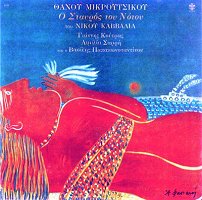 Thanos Mikroutsikos was very successful at setting to music 11 of Nikos Kavvadias' poems which were published under the title "O Stavros Tou Notou" (The Southern Cross) (LYRA CD 0004). 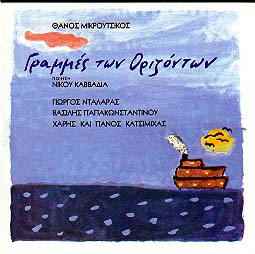 In 1992, Thanos Mikroutsikos returned with a double CD "Grammes ton Orizonton" (Horizon Lines) (Μίνως MCD 979/980) with 17 poems of Kavvadias set to music, of which 11 are new versions of the previous album, while 6 are new. With such great vocalists as Giorgos Ntalaras, Vassilis Papakonstantinou, and Charis and Panos Katsimichas, the album exceeds all expectations. In 1986, the group Xembarkoi published the CD "Nikos Kavvadias, S/S Ionion 1934" (Μίνως 7243 4 80551 2 5). The work includes 11 poems set to music composed and performed by Elias Ariotis and Notis Hasapis. Demetra Galani performs one song. Musically, this is in a completely different style than Mikroutsikos' work and adds another dimension to our appreciationn of the poetry. Inculded are Pousi, Karanti, and A Bord Del'"Aspasia", and it is interesting to hear how the same poems insipred different compositions, both with thier own merits. In 1977, Mariza Kokh was probably the first greek artist to set Kavvadias' poems to music. The LP, "Mariza Kokh" (Columbia 472445 2), includes 8 poems by Kavvadias. |
LINKS
Movie "Between The Devil And The Deep Blue Sea" (1995)
Thank you for visiting the poetry of Nikos Kavvadias.
Your comments will be greatly appreciated.
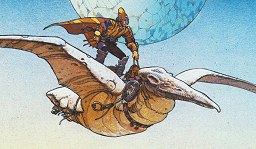





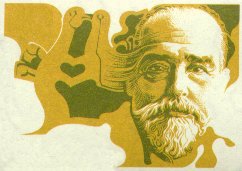

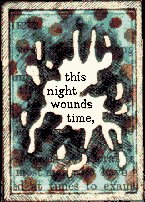
This page was last updated on October 12, 2002, Lefkosia, Cyprus.
© 1996-2002 Tefkros Symeonides
The painting of Kavvadias is by Yiannis Tsarouchis.
The biographical note was translated from liner notes in Kavviadias' poem collections. These liner notes and the poems are © Ekdoseis Agra and Tzenia Kavvadia.
The ship in the background is from the collection Pousi, published by Agra 1991.
The bird rider is from a painting by Moebius (Jean Giraud).
This counter was initiated on 3 January, 2004.